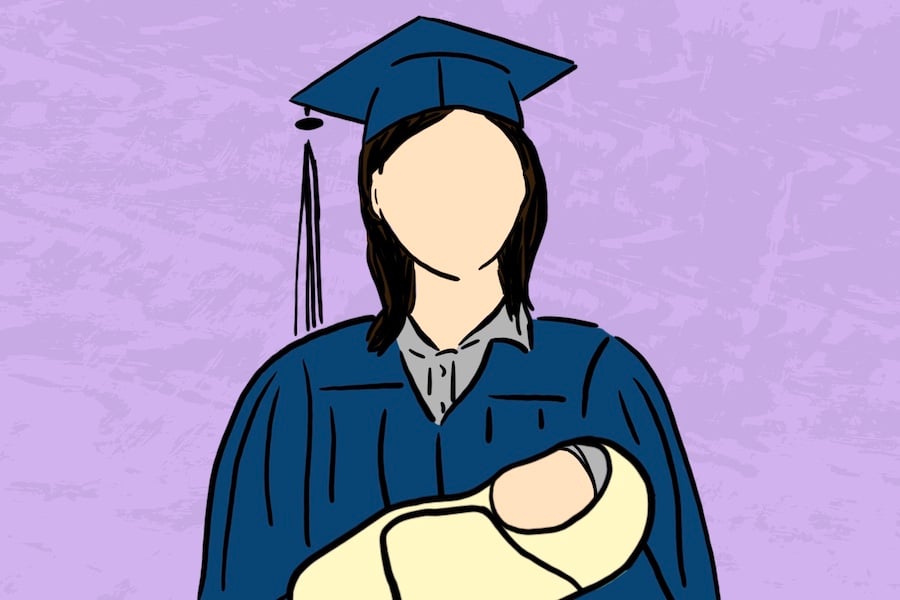Addressing the “elephant in the room”: New program provides support to teen parents
Kemone Hendricks, founder of Evanston Present and Future, is starting the Teen Parent Leaders Present and Future to provide teen parents with resources and support.
October 15, 2020
Kemone Hendricks became a parent when she was 16 years old.
As a high school student facing pregnancy and motherhood, she said her family helped her with issues she faced, but she wished she had more support from her community. At Evanston Township High School, she was judged by her peers and her teachers, and followed by whispers that her future was over. People told her she should forget about school.
Hendricks, now 34 and the founder of Evanston Present and Future, said teen parenting is a “big elephant in the room.” When a Black teenager has a child, she said they’re looked at differently than a White teen. Her experiences in the community have led her to start Teen Parent Leaders Present and Future, a program to provide teen parents with support and services.
Parents 25 and under who live in Evanston and the surrounding areas are eligible for the free program, which is accepting 20 to 25 teen parents per year starting in 2021. Upon completion of the program, individuals will receive funds to pursue a college education, an entrepreneurship, or a trade skill, and will receive assistance in gaining full time employment.
Hendricks has worked with teen parents in the past, with projects ranging from providing them with free PPE during the pandemic to creating focus groups for them.
In Evanston, Hendricks said there’s a wide range of services to support the children of teen parents, but she hasn’t seen much support for the parents themselves. She doesn’t think the community is investing in teen parents enough, she said, which is why she is doing this work.
“There’s a lot of resources for mothers in general, there’s a lot of resources for teens in general,” Hendricks said. “But teen parents, I want them to be out of that same long line that everybody else is waiting in for services, because their needs are more important and greater because of the kind of situations that they’re in.”
Tilly-Ana Ceriser, case manager and family support specialist at the Infant Welfare Society of Evanston, works with teen parents, and said while the city provides services and support, the Evanston community needs to work on breaking the stigma that comes with being a teen parent.
Ceriser said it’s important to encourage teen parents, check in on their mental health and show them that their lives aren’t over. Many teen parents struggle with physical changes associated with pregnancy, as well as mental health struggles, relationship difficulties and financial instability.
“It can happen to anybody,” Ceriser said. “It’s not just individuals who fall under Black or Hispanic. That sometimes is a stigma in itself.”
Part of the goal of the program is to provide teen parents with sources of income and a path forward, so they don’t get stuck in what Hendricks described as a cycle that needs to be broken. If a teen parent isn’t equipped with resources and support, she said it’s going to be more difficult for them to provide for their own children. By keeping requirements minimal, Hendricks is trying to make the program accessible to more people.
According to the Centers for Disease Control and Prevention, the Illinois Teen Birth Rate in 2018 was 15.8 percent. The teen birth rate has been decreasing, according to the Illinois Department of Public Health.
Cary Archer, manager of education and outreach at Planned Parenthood of Illinois, said it’s also important to provide teens with medically accurate, “non-shame based, non-stigmatizing” sexual education. He said that includes talking about birth control, pregnancy and sexual health.
“People don’t deserve to be stigmatized or shamed based on where they’re at in life,” Archer said. “By providing medically accurate comprehensive education you’re able to give young people the knowledge and the skills so that they can make the decisions that are best for themselves.”
Hendricks said many factors, including family support, income and race, can impact a teen parent. The cycle of teen pregnancy is tied to systemic issues, including institutional racism, she said. According to the CDC, Illinois is one of the states with the largest disparities between Black teen birth rates and White teen birth rates.
Hendricks said from her experience, Black teen parents are more likely to need more assistance than their White counterparts, but that help isn’t always easy to give, or to find, which makes her question the general societal willingness to break the cycle that is disproportionately impacting teenagers of color.
“It’s not an easy thing to help a teen parent — it’s a challenge,” Hendricks said. “Do we have enough leaders in the community that is up for that challenge? Do we really want to break the cycle? It’s a systemic issue along with other systemic issues.”
Email: [email protected]
Twitter: @delaneygnelson
Related Stories:
— Activists, nonprofits, black businesses, politicians, dancers, musicians and poets unite to celebrate Juneteenth
— The Garage identifies personality traits of highly successful entrepreneurs in new study
— Ald. Rue Simmons, twelve black organizations announce proclamation for black justice


